News from the Mythosphere, Part One: Mother Earth and Father Crow: A Myth for this Decade
 11.26.2011
11.26.2011

What on earth is going on?
The news on earth is demonstrations all over the world. Occupy Egypt’s Tahrir Square. Occupy Tunisia. Occupy Libya. Occupy Syria. Occupy Yemen. Occupy Wall Street. Occupy Berkeley. Occupy Oakland. Occupy Los Angeles. Occupy Davis. Occupy Seattle. Occupy Portland. Occupy Chicago. Occupy Denver. Occupy Boston. Occupy Washington D.C. Occupy Atlanta. Occupy Vancouver. Occupy London. Occupy Berlin. Occupy Madrid. Occupy Rome. Occupy Athens. Occupy Mexico City. Occupy Bogota. Occupy Tokyo. Occupy Sydney. Occupy Wellington. Occupy Cape Town. Occupy Paris.
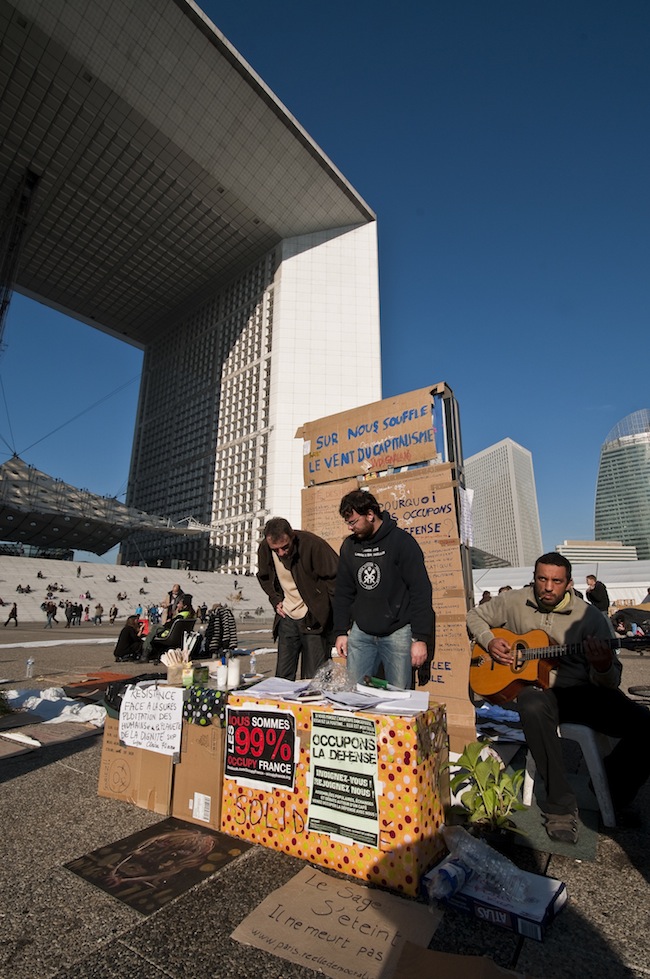
What is moving so many people from so many countries into the streets?
Panic and fear. Poverty. No jobs. Economic inequality. Rage at tyrannical government.
The U.S. is no different, but there it also involves the collapse of the housing market. Loss of homes. Rapacious banks, corporations and Wall Street. Unresponsive, ineffectual government gridlock. The rage of the 99% at the mega-wealthy who refuse fair taxation, while social services—education, health care, and every form of social security—are gutted.

Whenever there is a great shift in the zeitgeist, a paradigm change, there is chaos and confusion about what it all means. Where do you turn for a long-range perspective? We turn to myth. Especially Greek myth. The world’s myths contain all the stories that have ever happened, and will happen, over and over again.
A good friend who loves Greece as much as we do told us of a conversation she had with Henry Miller. The two of them agreed that the air is intelligent in Greece.
Whatever the reason, some of the greatest stories of the mythosphere, a word coined by our mythographer friend Alexander Eliot, come from ancient Greece.
Here are a few that come to mind lately:
The story of Rhea and Cronus.
The story of Pan.
The story of Hestia, goddess of the hearth.
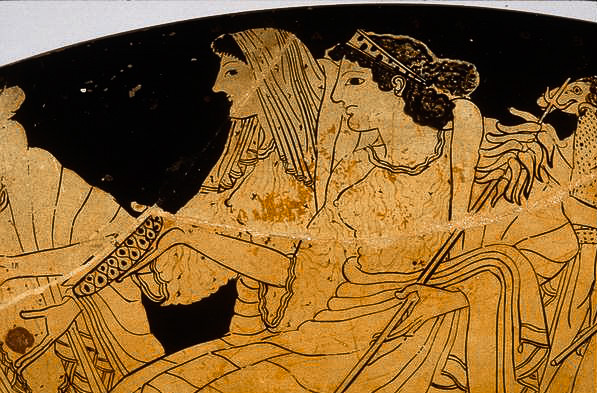
In three consecutive Paris Play posts this week, we’ll tell you three stories, with our take on how we think they’re connected to what’s happening right now in the world.
First, the story of Rhea and Cronus. According to the poet and writer on myth, Robert Graves, Rhea’s name probably means “earth.” Which suggests that she is that ancient goddess, Mother Earth, also known as Gaia.
Graves thinks Cronus’s name means “crow” or “crown,” rather than “time."
Robert Graves’ The Greek Myths is our major source, but this is a modern retelling.
Mother Earth and Father Crow: A Myth for this Decade

Mother Earth was enraged. Every time she gave birth, her husband, Cronus, would eat the child. Each year he’d swallowed one of them: first Hestia, then Demeter, then Hera, then Hades, and lastly, Poseidon.
They were not the healthiest family. She should never have married her brother, she knew that now, eons later. Their father, Uranus, had filled Cronus’s head with paranoia, convincing him that one of his children would knock him off his throne. But why have children, for gods’ sake, if you’re not going to share power and resources with them?
This time it would be different. This time she’d trick Father Crow. She would hide the baby from him. When her latest offspring, Zeus, was born in the middle of the night, she took him to a mountain, bathed him in a river, and hid him in a cave on Crete.
There he was raised by two sisters, Adrasteia and Io (known as the Honey girls), and the Goat-nymph, Amaltheia. Baby Zeus was fed honey, and goat’s milk from Amaltheia, and so was his foster-brother, Pan.
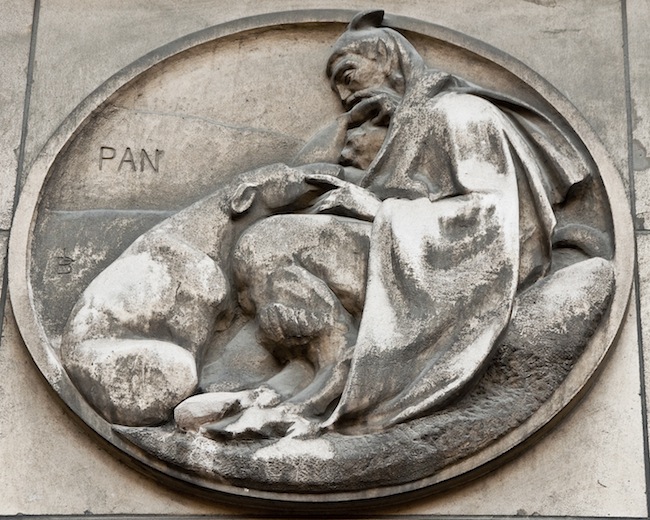
Zeus’s golden cradle was hung on a tree, so that Cronus couldn’t find it in heaven, on earth or in the sea. Rhea sent her sons, the Curetes, to stand around the baby Zeus, and drown out the sound of his crying by banging their spears against their shields and shouting. This was good noise, “white noise,” to protect the innocent from a callous oppressor. According to Graves, Curetes meant “devotees of Ker, or Car,” one of the names of the Triple-Goddess.
Rhea wrapped a stone in swaddling clothes and gave it to Cronus to swallow.
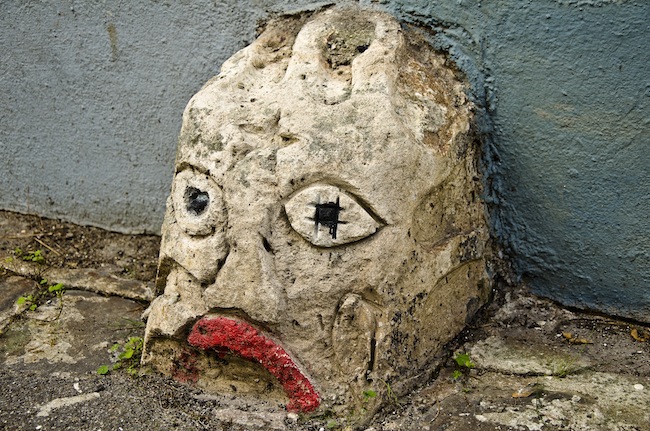
In yet another cave, Zeus was raised among shepherds in Ida. Everyone needs a safe place on earth to occupy, and even a cave is safer than being eaten by your own father.
As Zeus grew up, The Titaness, Metis, advised him to go see his mother, Rhea, and ask to be given the role of Cronus’s cup-bearer. More trickery was needed.
So Rhea gladly helped her son by giving him an emetic drink, which Metis had told him to mix with Cronus’s honey drink.
Cronus drank it up and vomited out the stone, as well as all of Zeus’s older brothers and sisters. They were so grateful, they asked Zeus to lead them in battle against the Titans, all those calcified Holdfasts who don’t share the wealth.

This war lasted ten years. Finally Mother Earth prophesied that Zeus would win if he combined forces with Cronus’s prisoners in Tartarus.
Zeus went to their female jailer, Campe, killed her, grabbed her keys and set free the Cyclopes and the Hundred-handed Ones, whom he strengthened with divine food and drink. This was really a movement of the people, of the disenfranchised, the 99%. The Many against the One.

The Cyclopes in turn gave three gifts to Zeus and his two brothers, Hades and Poseidon: the thunderbolt to Zeus, the helmet of darkness to Hades, the trident to Poseidon.
Hades, now invisible, snuck in and stole Cronus’s weapons. While Poseidon threatened him with his trident, Zeus zapped Cronus with his thunderbolt. Stealth, trickery and force were needed to overthrow Father Crow.
The three Hundred-handed Ones threw rocks at the Titans, and Goat-Pan gave a sudden shout which made them flee. Rocks and shouts, a riot.
The gods ran after Cronus and banished him and all the Titans except Atlas. Where? Accounts differ—perhaps to a British island in the far west, or perhaps to Tartarus. Anyway they were kicked out of power, and guarded now by the Hundred-handed Ones, whom they had once jailed.

Atlas was given the punishment of carrying the sky on his shoulders. It seems harsh, but perhaps it’s the cost of leading the forces of tyranny, which, worse than harsh, are lethal.
Zeus set the stone which Cronus had swallowed down at Delphi, the sacred place of measure. One of the phrases carved into the temple was: μηδέν άγαν (mēdén ágan = "nothing in excess").
The constellation of the Serpent and the Bears is said to be Zeus (who shape-shifted into a serpent when Cronus discovered he’d been tricked with a stone) and his nurses became the bears.
To thank the three nurturing nymphs, Zeus put the goat-nymph Amaltheia’s image in the stars—Capricorn!—and gave one of her horns to the two Honey sisters, which became the Cornucopia, the horn of plenty, which is always filled with whatever its owner wishes to eat or drink.
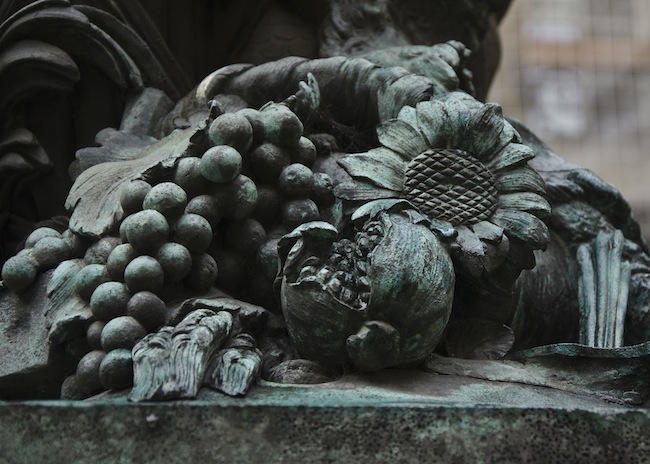
It had taken ten years of battle, but at last the people had food and drink and plenty, which is usually the case when kingdoms have wise rulers who distribute wealth instead of hogging it. Stone soup had been transformed into a nourishing feast.
Mother Earth was well pleased. Her children could flourish, and so, at last, could she.



Reader Comments (14)
This retelling of the myth Rhea and Chronos, tying it to our current world sorrows, is fantastic. I can't wait for the next two myth tellings. Richard's photos keep getting more poignant and spot on. You two keep amazing us fans.
Jane
Another of my favorite people: Robert Graves. Of all the delvers into myth, he is the most romantic, the most poetic (and sometimes, according to other mythologists, the most imaginative). I'm still trying to figure out the finger alphabet. For me, he's far more interesting than Joseph Campbell.
Have you read the 3 volume biography by his nephew? Fascinating...especially Volume 2, the years with Laura Riding. Such a strange woman, so creative/ destructive, but ultimately self-destructive. I sometimes think of her as an authentic witch (even to her physical appearance).
Dear Kaaren and Richard, Master Teachers of the Mythosphere,
As I've written before, I must time my reading of your posts, as they deeply penetrate my subconsciousness, taking my being hostage on a (valued) journey to greater awareness. A case in point, is that I read and viewed this post before I went to sleep and awakened with the images, particularly, the polar opposite symbolism of the cell and the butterfly.
This leaves me feeling grateful that you offer this place to express how your stories change me. Otherwise, I may just pop out of my skin with the sense of expansion that ensues.
I appreciate your knowledge and dedication to researching, and sharing the keys of myth for practical application, which lead me to the liberation symbolized by the butterfly. I was surprised by the oddly aesthetic beauty of the jail cell, lock and key, and the sprouts of grass that managed to grow around the bars. This brought to mind the seductive golden cages and tender traps we can fall prey to in this world. Perhaps, even while feeling trapped there is the potential for new growth,a continuum, cycling from traps to liberation.
Really, the depths that your stories touch to are inexplicable.
Love,
Marguerite
Dear Jane,
What a delightful message! There must be a reason why myths and all the sacred books of the world have endured for centuries: their stories illuminate the web of forces, the meaning behind the ever-changing, but cyclic drama of humans and the earth. Our job is to be seers, to try to divine which stories are unfolding now so that we can help in transforming the world and being transformed.
I think the Rhea and Cronus story moves in the direction that you and your daughters are moving in the big changes you've made and are making in your lives.
And we hope to give you some animal images for your next sculptures.
Love,
Your Fans, Kaaren & Richard
Dear Ruth,
We couldn't agree with you more about Robert Graves. Since he focused on myths of the Mediterranean area, especially Greek and Italian, I think of him as having more depth, whereas Joseph Campbell who covered the myths of the world had more breadth, perhaps. But yes, Graves is one of our favorite seers too.
A friend of ours asked us the other day, if you could have lunch with any person who lived in the last century, who would it be? I mentioned Virginia Woolf, Marcel Proust, Chaucer, Montaigne, and a few others. And later I thought, Robert Graves, since he was poet, seer, mythographer, historian, novelist. He is one person I regret not meeting while he was alive. I had the chance years ago when I was on my way to Ibiza and Mallorca, and got sidetracked by a big event.
We are so grateful to you for reminding us that we must read this Graves biography. I'll go look for it tomorrow. Yes, Laura Riding was a true muse, a White Goddess woman, a poet-seer, who was wild and strange. One of my favorite books is Graves' The White Goddess, and oh, you are so right about her being a witch. Since witches were simply women who had prophetic powers, and were demonized by the patriarchy. Long ago, prophecy came from women, but that gift was wrested away and given to male gods like Apollo; originally it came from the sibyls, the priestesses, all women.
And the finger alphabet: want to have a dialogue about that earth lore (as you know, still alive among the Druids centuries later) and from that, we'll do a post based on the alphabet?
Oh rats, we should have spent more time with you and Bill when we lived in California!
Love,
Kaaren & Richard
Dearest Marguerite,
You know, we felt trepidatious about this post, since it is both spiritual and political and these are dangerous subjects which polarize people, even people we know and love. But the three comments we've read so far today, from you, Jane and Ruth, make any fallout from the post okay with us. What blessing you give! All writers, photographers, artists need only one response of the sort you've given to make the struggle involved in this kind of "making" worth it.
Isn't this all that any of us want to do on earth--give a gift that is valued, by someone or some two?
We love and appreciate your deep understanding of the images of cell and butterfly. And you manage to look so closely at both the sensory details and the larger resonance. I know that's what made you such a brilliant yoga teacher. Are you sure you don't want to move to Paris?
The depths of these stories are the depths of the mythosphere. We have the freedom to ignore the web of meaning behind appearances, but who would want to? That just leads to confusion, even despair. Why not go for wholeness and joy instead? (That's our bias, anyway.)
You are a giver of blessing, and oh, how we appreciate it.
Love,
Kaaren & Richard
We did everything backwards: first bought a place together, then moved in, then had a honeymoon, then got married, and now we date...
...in Paris, looking upward, romancing in the bitter-sweetness of an emerging new Zeitgeist.
Scott!
Leave it to you to link the two pieces in a fresh way, just as you did in your book, "The Hippie Narrative; A Literary Perspective on the Counterculture." You have such a great sense of linkage, of the zeitgeist of the past, we'd like to know if the Rhea-Cronus myth reflects your sense of the current zeitgeist too.
Thank you for reading deeply, and for responding.
Much love,
Kaaren & Richard
I want to be like the prophetess in the gospels, whose name -- conveniently enough -- was Anna. (Prophecy is still alive and well today, and many women practice it. Some will blow your shoes right off your feet.) I want to stop referring to myself as "the 99 percent" and start referring to myself as one of the Three-hundred-handed Ones. I want to stop repeating myself (how terrific these stories are, how terrific these photos are), but I can't.
What a treat. What a working vacation for the mind.
Yes, Anna, you ARE that prophetess. I remember something you said once about crows that is echoed in this myth.
And don't think we haven't noticed how many hands/arms you have working and giving at once.
But do go on, repeat yourself. Really, we can take it.
We're so grateful!
Love,
Kaaren & Richard
So, what I wonder is holding Crow in place within us, if not the desire that we too one day may become or already are the 1%.
That is to say, Crow is The American Dream, and until we disgorge its rock-hard fabrication, we are doomed.
It is not the 1% who have to let go of it; rather it is the 99% who have to.
We must get rid of what pre-occupies us.
Bruce
Hi Bruce,
We'd make a distinction between the American Dream and Dragon Holdfast energy, what Father Crow represents. We know people who have achieved that dream of abundance and share it with generosity and grace. We know millionaires who believe that there is something seriously out of balance in the way our government taxes corporations and the rich; that real fiscal crimes have been committed; that global warming is no fiction; that the health of a nation is more important than fighting foreign wars. That everyone deserves health care, food, shelter and education, not just the super-wealthy.
This is not a struggle between those who believe in the American Dream and those who do not. It's a struggle for fairness of the most basic kind.
We think the health of our planet is what's at stake here.
Love to you,
Kaaren & Richard
Dear Kaaren and Richard,
Thank you once again for a rich and insightful journey, beautifully told. I love the connections you're making here, still more evidence that myths persist and expand and shape-shift (like Zeus) to re-embody essential truths in new contexts.
I'm especially fascinated by Zeus' placement of the regurgitated stone at Delphi; in a sense this stone is his (proxy) twin (and, in another sense, his savior). It seems quite fitting that it be given a sacred home at Delphi where his own son would later be honored. And "nothing in excess" is sound advice, (and so very Apollonian) not only in retrospect for Cronus who could have heeded it himself, but for our culture. Though human nature is undoubtedly prone to excess - Dionysus lives! I wonder if we collectively will ever be able to tame this? And should we? Ecstasy is a wonderful thing and we can't help but seek it. Is the problem that we seek ecstasy in material forms that can never be fully satisfied? (i.e. leading to over-reaching greed). Or does this greed - for power, for wealth - come out of fear? (Ack...I am generalizing!) In any case, the imbalance has tilted much too far so that the discord and suffering and injustice have roused another kind of power in the Occupy Movement.
Another interesting aspect of this tale is Cronus' attempt to circumvent the prophesy. I'm still reading Michael Wood's The Road to Delphi and so am very caught up lately in thinking about fate and crossroads and oracles and attempts to dodge or outrun them. Of course, as Wood says, "Prophesies are neither true nor false at their utterance. They are awaiting confirmation..." But this makes them no less powerful or unsettling! What crossroads have we reached as a culture, and what oracle is waiting to be fulfilled? And will we have the strength to face it with dignity and grace?
Sending gratitude for your thought-provoking and insightful and beautiful post...
Much love to you both!
dawna
Dear Dawna,
Your comments are so eloquent, we'll let them stand with minimum comment from us. You do seem to foresee the subsequent post which is about riotous excess, Pan who is so close in wildness to Dionysus and his Maenads.
Isn't it telling that the gods of ecstasy are connected not to things, but to nature, to wine, making merry and dance? Not at all to things, not at all to power or wealth, but to an overflowing feeling.
The Road to Delphi sounds good. We'll look into it.
And we're extremely grateful to you for a close and deep viewing.
Much love,
Kaaren & Richard